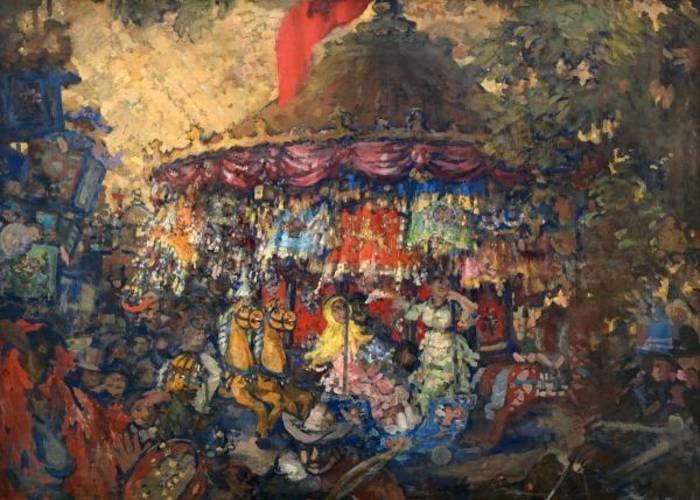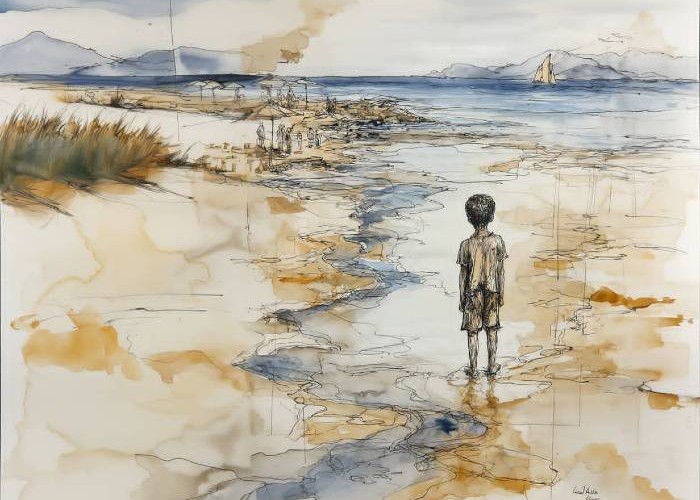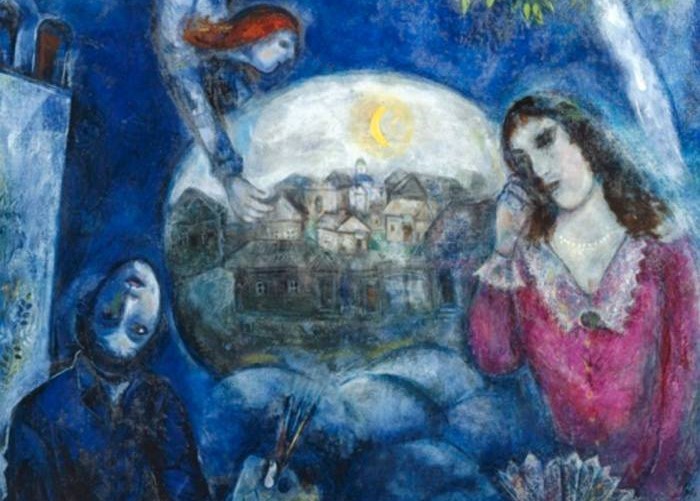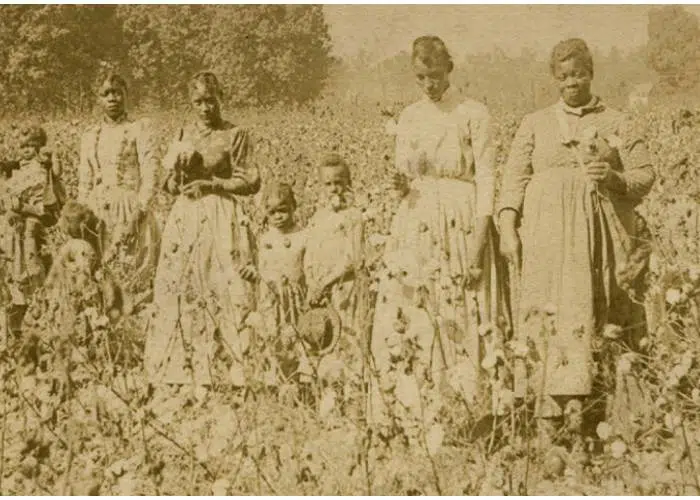Andy McGovern was not a cruel owner. No, sir, he was not. And his manager Jamison was not at all a beast. Of course, there were punishments and whippings at Fairy Hill too, but none were like the horrors on other plantations. No sir. Stories that came from the Green’s Plantation would make your hair stand on end. But Master McGovern was very fair: Get up every morning, go to the fields, meet your daily norm of cotton and no one will bother you. They even used to call a doctor, if one of the slaves fell ill. Master McGovern took good care of his slaves. They’re not cheap after all.
Slaves lived in a small village by the woods in tiny, flimsy huts. Each hut had a vegetable patch next to it. Small, yes, but your own piece of land to grow some okra, yams and squash. And Master McGovern was not against it. Why would he be? When the slaves are content, they work better and don’t try to run. That’s what he believed. And that’s what he used to tell Jamison. Jamison was paid a handsome salary to do his job, so why would he argue?
That’s why everyone was in shock when Quasheba, or should I say Betty, ran off. Later, when she was caught, we found out that she hooked up with a run-away slave who was making his way North from down South and was laying low in the woods near McGovern’s plantation. Our Betty was into herbs. She used to go far into the forest to pick them herbs. I guess that’s where they met. And I guess he started messing with her head, telling her to run with him. I don’t know why. Why would he need a stupid girl to slow him down?
Quasheba was going into the woods every goddamn day. I told you, there was no tight security on McGovern’s plantations. No one really watched the slaves. Why bother? Who in their right mind would run from an owner like Master Andy?
No one noticed Betty’s absence the next day. And the fact that she wasn’t in the field didn’t alarm anyone. Maybe she was sick or somethin’. But on the third day the news spread that Betty hadn’t slept in her hut for two nights and that her son, little Juba, had been starving for days. Quasheba hadn’t a husband. She had no relatives either. Anyway, relatives on a plantation were a rarity. But she had Juba, her one and only son.
Betty was dark—so dark that her skin looked blue. But Juba was a lot lighter. Of course, people talked. Some thought Jamison was the father, but I think that’s a load of horse shit. Jamison liked his women fat and white. Every chance he got, he went to town to Lou Ann’s place and had him some fun. No one had ever seen him with a slave girl. No sir.
But Master McGovern was of a different sort. He didn’t miss a single carnival, or even a simple party that took place in the village. The slaves were so used to him being there, that they would laugh and dance, and carry on as if he wasn’t even there. And if someone watched Master McGovern closely, the way he was looking at the dancing gals, the way his gaze would set on one of them and get cloudy… you know what I mean. After all, Juba was not the only Mulatto boy on the plantation.
I am not implying anything. I really don’t know if there was anything between Betty and Master McGovern, but I can say for certain, he never punished her for anything. And she was never pushed to work too hard. That’s for sure. She lived on Master McGovern’s plantation as if in Abraham’s bosom. And this stupid girl decides to run!
Of course, Master McGovern had to send a search party—and, mind you, that costs a lot of money. Sometimes the search costs more than a run-away slave. But they can’t just forget about it. It’s a matter of honor. If a plantation owner doesn’t catch and punish the run-away, then what will the neighbors say? What kind of example would he set? And then, it’s a matter of principle. You let it slide once and they will all run. The plantation owner cannot show weakness. No sir.
When Betty was caught and brought back in a cage, anyone could see that Master McGovern wasn’t enjoying the sight. He came out, took one look at the cage in which Betty was howling with fear, gave some orders to Jamison, and went back into the house. He didn’t even want to watch the whipping.
Betty was whipped for two hours. Two long hours. Four men took turns. People crowded around to watch, even though no one made them. After all, whippings were a rare sight in the village. When it was over, people were chased away and Betty was left to die. Women were told not to touch the body. They were crying, of course, and whispered how awful it all was, but everyone understood that there were worse ways to die for the crime that Quasheba committed.
In all that commotion, little Juba was completely forgotten. And would you believe it—it was Master McGovern who asked to bring him in. First, Juba was sent to the kitchen to help fat old Jemima. But in just a few weeks Master Andy arranged for the boy to go live in town as an apprentice for a blacksmith. “So we can have our own blacksmith later on,” explained Master McGovern to Jamison. As if anyone argued with that.
When Juba’s papers were made out, Master Andy ordered to change Juba’s name to James. His first son’s name was also James. Maybe that was the reason. “I am tired of these barbarian names, he said. Let him have a good Christian name, he said.” And for the surname he said to write “McGovern”. Many slaves were given owners’ names. So no one thought nothin’ of it.
***
Every day Kevin McGovern came to the corner of 3rd Avenue and Grand Street. It was his intersection. It just happened that way and no one questioned his right to sit here with something pitiful like “A Gulf War veteran, homeless and hungry” scribbled on a piece of cardboard. Although Kevin McGovern never went to a war, he was homeless. Most nights he slept in a shelter and when the weather was nice, he slept wherever he could find a spot. And he often went hungry. That was true as well. But as for the reason of the unfortunate state of his affairs, they were better left unmentioned. The truth would hardly awaken any compassion in a passerby—ones like this black woman in her fancy metallic Maybach. She wouldn’t give any money for sure.
Cecilia McGovern was coming home from a cardiologist conference. It didn’t make sense to book a hotel. Two hours or so on the highway and she’d be home. But she had to get gas first, so she took the nearest exit and wound up in an unfamiliar town—and, it appeared, not a good one. It had a beggar on every corner. Cecilia took a dollar out of her purse. She always gave money to street beggars. Her boyfriend Les would scold her: “Cece, you are trusting and naïve like a child. These scoundrels are pulling your legs!” So what? Let them. Even if just one of them is really in need, then it’s already worth it. Besides, if someone is forced to beg—whatever is the reason—you have to feel sorry for them.
Cecilia always tried to imagine what made those she helped with a dollar or two ask for these handouts. This red-haired young man with freckles, for instance. What’s his reason? Most likely it was alcohol, maybe even drugs. Poor devil. Cecilia lowered a slightly tinted window of her Maybach and handed Kevin the dollar.
“God bless you, ma’am,” Kevin bowed to Cecilia. Cecilia smiled back. She looked serene and regal. Like the queen of Sheba, thought Kevin.
A few seconds later the light changed, and the gorgeous metallic Maybach took off, forever parting Kevin from Cecilia. They were two very different people—from different towns and from different worlds. People with the same—albeit, common—family name. It is the name they inherited from their great, great, great grandfather, Andy McGovern.














































